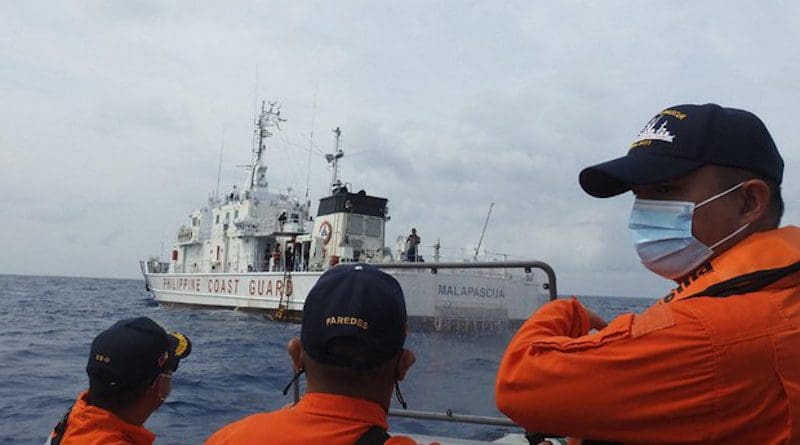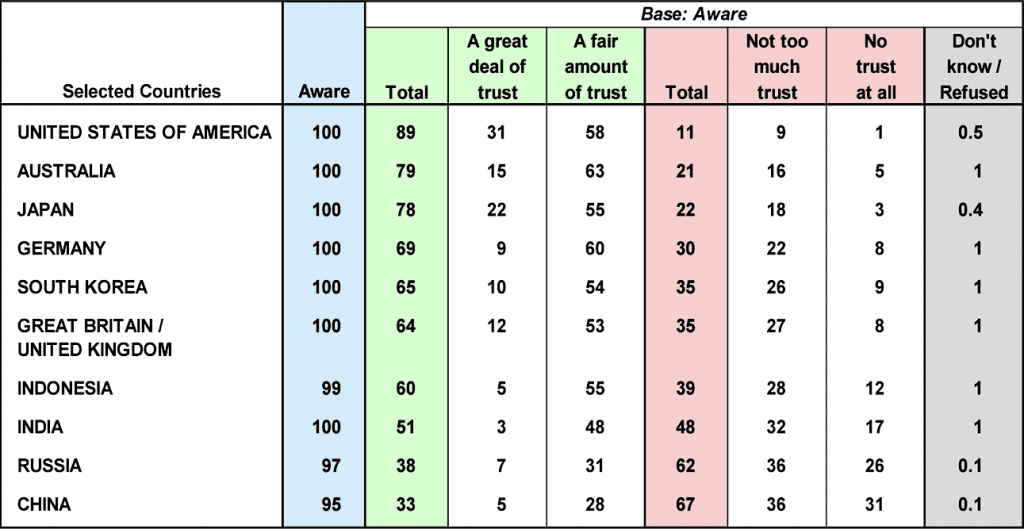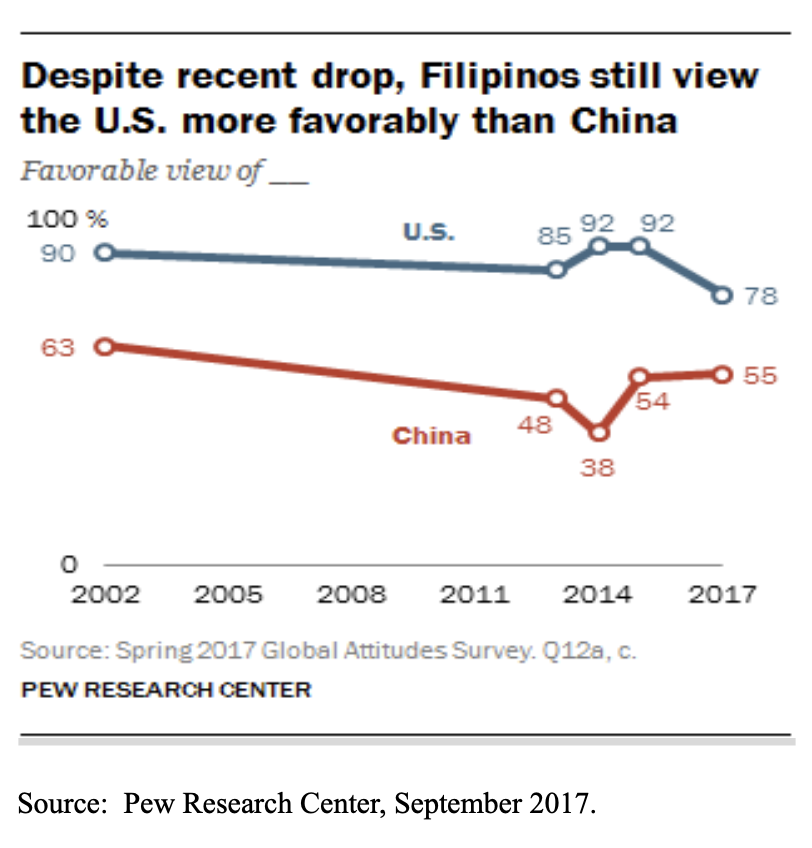The Philippines And China: Deepening Mutual Trusts In South China Sea Through Compliance And Accountability – Analysis
When President Ferdinand R. Marcos Jr. assumed office in June 2022, he gave the marching order to shift Philippines-China relations to a higher gear. He described China as the Philippines’ strongest partner in post-pandemic economic recovery (Bajo 2022). In his speech during the 19th China-ASEAN Expo in September 2022, he also urged the Philippines and other members of the Association of Southeast Asian Nations (ASEAN) to “move towards stronger ties” with China so they can achieve their goals of industrial transformation (DTI, 2022).
However, China’s growing presence in the South China Sea (SCS) continues to create tremendous security anxieties in the Philippines. Chinese fishing activities and maritime law enforcement operations around the waters of the Kalayaan Island Group (KIG) in the Spratly Islands and waters surrounding the Scarborough Shoal are perennial sources of security tensions between the Philippines and China. As a result, Filipinos have expressed distrusts toward China affecting inevitably the over-all dynamics of Philippines-China relations despite the repeated call of both governments that the SCS should not define their over-all bilateral ties.
In the most recent survey conducted by Pulse Asia published on July 29 this year, 31% of the respondents expressed no trust while 36% conveyed not too much trust toward China. Only 5% aired a great deal of trust while 28% voiced a fair amount of trust toward China. Majority of Filipino respondents expressed trust toward the United States, Australia, and Japan.
This recent survey was consistent with previous studies indicating China’s low trust rating in the Philippines. In a survey conducted during the COVID-19 pandemic, the Social Weather Station (SWS) reported that from 1998 to 2020, Filipino trust in China has been consistently low with 56% of Filipinos distrusting China in July 2020. In the September 2017 survey of Pew Research Center, Filipinos view the US more favorably than China. In this survey, Filipinos expressed fear that territorial conflicts with China can lead to armed confrontations. Since then, Filipinos sentiments against China have not significantly improved.
Aside from SCS issues, involvements of Chinese nationals in various criminal activities in the Philippines arising from their involvements in Philippine Offshore Gaming Operations (POGO) have exacerbated the “anti-China” feelings of Filipinos even those with Chinese ancestral backgrounds. For example, the Federation of Filipino Chinese Chambers of Commerce and Industry, Inc. (FFCCCII) denounced the unlawful activities of Chinese nationals involved in unauthorized online gaming activities and urged the Philippine government to deport Chinese illegal workers in POGOs (Cahiles-Magkilat, 2022).
Mindful of the trust deficit in Philippines-China relations, Chinese State Counselor and Foreign Minister Wang Yi visited Manila and met President Marcos Jr. on July 6, 2022 in order to promote mutual trust with the new Philippine administration. During his visit, Wang Yi stressed that Philippines-China relations have lasted for over a millennium that can far outweigh territorial conflicts and maritime jurisdictional disputes in the SCS. In his meeting with President Marcos Jr., he urged the Philippines and China to continue their activities in enhancing dialogue and communication so they can properly handle sensitive issues and “to let maritime cooperation be the main tone of bilateral discussion and handling of maritime affairs, and make the building of good neighbors, good relatives and good partners the new consensus between the two peoples” (MFA, 2022).
Indeed, the Philippines and China need to sustain their efforts not only in the promotion but also in the deepening of mutual trusts. Though trust remains an elusive concept in international politics and security studies, it is a valuable concept because it enables states to reduce one of the main problems in international anarchy: uncertainty (Milders, 2012). Mutual trust building can facilitate states to overcome security uncertainties in the anarchic international system.
Since the SCS is the major source of distrusts between the two countries, the Philippines and China should pay greater attention on trust building in the SCS. Aside from routine diplomatic activities, the Bilateral Consultative Mechanism (BCM) in the SCS implemented during the Duterte Administration is an exemplary practice in deepening mutual trusts as the process has provided important venue for the Philippines and China to rebuild confidence and promote pragmatic cooperation in functional areas. Given the current situation in the SCS, it is imperative to sustain the BCM under the Marcos Jr. Administration by avoiding its pitfalls and maximizing gains achieved during the process.
The BCM already held six meetings where both countries candidly discussed prospects for cooperation in various areas like political security, fishery management, marine scientific research, marine environmental protection, search and rescue operation, maritime law enforcement and development of natural gas and oil. Despite some challenges arising from their different national positions on key sensitive issues, China and the Philippines have gained from the BCM in terms of opening their official channels of communication to overcome their recurring differences.
There is no doubt that the BCM has effectively provided a mechanism not only for confidence building and trust creation but also for functional cooperation, risk management, conflict avoidance, and most importantly preventive diplomacy in the SCS (Banlaoi, 2021). Though there is a view that China is just using the BCM to showcase its preferred bilateral approach in tackling the SCS disputes that are multilateral in nature, abandoning this process, however, is wasting some strategic gains in bilateral efforts that can undoubtedly contribute to multilateral solutions to SCS problems.
There is a need to emphasize, however, that the deepening mutual trust rests heavily on how parties seriously abide by their mutual understanding and strictly comply with the rules that they have established. Repeated unilateral actions that defy rules are anathema to deepening mutual trusts. Non-compliance of the norms as well as intentional and even non-intentional cheating on the established expectations for international behavior can ruin trusts built through consultations and communications. Rules if not enforced and violations if not accounted for are recipes for trusts to unnecessarily erode.
Thus, strict compliance and strong accountability are essential ingredients for deepening mutual trusts. Mutual trust is strongly built through habitual compliance with rules and established expectations for behavior (Suchman, 1995). Compliance and accountability can move parties from negative peace, where there is the absence of war, to positive peace, where there is shared development and prosperity as well as common security in the SCS (Oesner, 2017).
The BCM, if sustained and enhanced by the Philippines and China under the Marcos Jr. Administration and the Third Term of President Xi Jinping, should spend more discussions on the twin issue of compliance and accountability in order to really deepen mutual trusts between the two countries. Compliance and accountability should also inform the ongoing negotiations on the China-ASEAN Code of Conduct (COC) in the SCS to also promote mutual trusts in the greater SCS region.
Deepening of mutual trusts can be effectively achieved with greater clarity on compliance and accountability of parties. Otherwise, the Philippines, China and other stakeholders in the SCS disputes will continue to suffer mutual fear in a guessing game situation where parties confront the security dilemma amidst uncertainties in which unilateral actions by a state to pursue one’s security can cause insecurities in other states.
***
*This paper is based on the speech delivered at the International Symposium on Global Maritime Cooperation and Ocean Governance 2022 held in Sanya, China (hybrid) on 3-4 November 2022. This piece is also part of the author’s book project, The South China Sea: Conflict and Cooperation in Philippines-China Relations. The author is grateful to the Federation of Filipino Chinese Chambers of Commerce and Industry, Inc (FFCCCII) for supporting this project.
**Rommel C. Banlaoi, PhD, is the President of the Philippine Society for Intelligence and Security Studies (PSISS), Chairman of the Philippine Institute for Peace, Violence and Terrorism Research (PIPVTR) and member of the Board of Directors of the China Southeast Asian Research Center on the South China Sea (CSARC). He is also a member of the International Panel of Experts of the Maritime Awareness Project (MAP) of the National Bureau of Asian Research (NBR) and the Sasakawa Peace Foundation. He was the President of the Philippine Association for Chinese Studies (PACS), member of the Management Board of the World Association for Chinese Studies (WACS), Adjunct Research Professor at the National Institute for South China Sea Studies (NISCSS), and Fellow of the Asia Pacific Center for Security Studies (APCSS).
REFERENCES
Bajo, A.F. (2022, June 10). Marcos calls China our Stongest Partner. GMA News. https://www.gmanetwork.com/news/topstories/nation/834541/marcos-calls-china-our-strongest-partner/story/
Banlaoi, R.C. (2021, April 22). The Bilateral Consultative Mechanism on the South China Sea: Achievements and Limitations in Philippines- China Relations Under Duterte Administration. ISEAS Perspectives 2021 (51), 1–8. https://www.iseas.edu.sg/wp content/uploads/2021/03/ISEAS_Perspective_2021_51.pdf
Cahiles-Magkilat, B. (2022, October 3). Fil-Chinese Business Wants Illegal POGOs Out. Manila Bulletin. https://mb.com.ph/2022/10/03/fil-chinese-business-wants-illegal-pogos-out/
Department of Trade and Industry (DTI, 2022 October 4). Marcos Jr Administration to Strengthen Ties with China, SEA Countries. DTI Official Website. https://www.dti.gov.ph/news/marcos-jr-administration-to-strengthen-ties-with-china-sea-countries/.
Milder, L (2012, April 29). “Does Cooperation at the International Level Require Trust?”. E-International Relations. https://www.e-ir.info/2012/04/29/does-cooperation-at-the-international-level-require-trust/.
Ministry of Foreign Affairs, People’s Republic of China (2022, July 6). Philippine President Ferdinand Romualdez Marcos Meets with Wang Yi. https://www.fmprc.gov.cn/eng/zxxx_662805/202207/t20220707_10716721.html
Oelsner, A. (2007). Friendship, Mutual Trust and the Evolution of Regional Peace in the International System. Critical Review of International Social and Political Philosophy, 10:2, 257-279. https://www.tandfonline.com/doi/abs/10.1080/13698230701208061?journalCode=fcri20.
Pulse Asia Research, Inc. (2022, October 11). June 22 nationwide survey on public trust in selected countries. https://pulseasia.ph/updates/june-2022-nationwide-survey-on-public-trust-in-selected-countries/
Social Weather Station (2020, July 14) Stratbase ADR Institute sponsors items on Filipino public opinion on China https://www.sws.org.ph/swsmain/artcldisppage/?artcsyscode=ART-20200714123142
Suchman, M. (1995) “Managing Legitimacy: Strategic and Institutional Approaches,” Academy of Management Review Vol. 20: 571-60.




